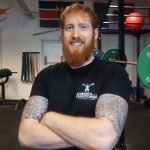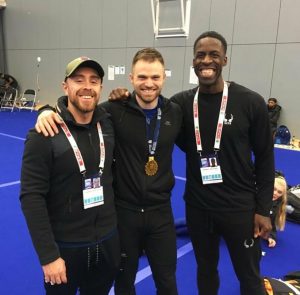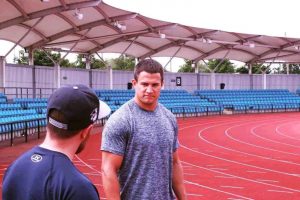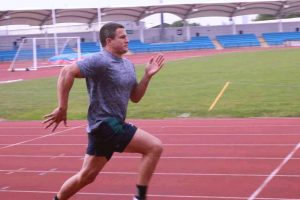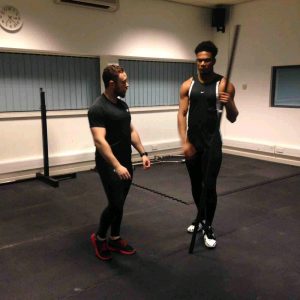INTRODUCTION
Hey, welcome to our first Meet the Expert blog.
In this blog, we interview expert coaches and athletes, delving into what makes them tick, what drives them to keep going, and what they believe to be the pitfalls and keys to success.
I am really excited for this first one as we have a seasoned coach with a wealth of experience in a variety of fields. I’d love to give a full introduction of his resume, but I’ll leave that to him.
Question 1: What is your name, age and where are you from?
Michael Carolan (Mike or MC), I’m 38 years old and from Manchester.
Question 2: What is your occupation? Is it what you are known for or completely separate? What jobs have you done in the past?
I’m a Sport Rehab Therapist, Strength and Conditioning Coach and Track Coach.
I have several jobs and wear different ‘hats’ for each. I’m currently teaching full time at the University of Salford on the Sport Rehabilitation degree where I am admissions tutor and lead for all the Exercise and Conditioning Modules. I integrate Strength and Conditioning into the degree to use for both injury prevention and rehabilitation.
When I’m not at the university I work with local sprinters from in and around the Northwest, namely head coach to Andrew Robertson, the GB National 60m Champion. I also support Trinity Powell, the U20 silver medallist in the 60m sprint.
Additionally, I work with GB and England Basketball where I have helped develop an 8-week athletic development training program and am responsible for the Women’s Under 18’s team.
Finally, I also head up the Sports Science and Medicine department for Macclesfield Rugby Union, where I work closely with Jay Curtis (S&C coach) and Izzy Adlington (Therapist) managing the playing staff throughout the season.
I also consult and present to teams and at events on topics around athletic performance and injury prevention.
Question 3: What is your primary area of expertise and why are you passionate about it?
I’ll be honest I don’t really see myself as an expert per se, instead I have a specialised generalist approach to all areas of athletic performance development and injury rehabilitation.
I am known for S&C with sprinters, basketball players and rehabilitation, however I think my greatest area of strength is in my ability to adapt to the needs of the landscape in front of me.
When I was with the Ministry of Defence, we had no rehab program and the S&C wasn’t adequate so I needed to develop my skills in both setting up such a large program for 500 troops on camp and at the same time being able to convey and communicate this vision to necessary stake holders.
I have keen interest areas in speed and power development, nutrition for health and performance and knee / lower back injury rehabilitation but I don’t set limitations on my skills and what they can offer people.
Question 4: How did you get started doing what you do?
I was on a degree at Crewe and Alsager in 1999, had hurt my ankle playing football which wrecked my track season. I met with a physio who I then asked about entry standards, came home, and told my mum I was going back to college to pursue this career direction.
Fast forwards 6 years (plus a few more) after qualifying and I became sick of people not doing their exercises and just wanting massage. I started taking people into the gym and training them and like a light bulb moment it took me down the route I’ve been on for the past 10 years or so.
Question 5: What are your weaknesses? What hurdles did you face and how did you overcome these barriers?
At first being dyslexic was a real challenge for me, it plays havoc some days with work, but for the most part I turned it into a strength, I can see big pictures and links between things others can’t, I can also retain vast amounts of information, which proved useful working with 100+ injured for the military.
It can be difficult though, my wife often coaches me prior to interviews so I stay on topic and don’t waffle, the same with any covering letters, some days it really can be frustrating.
One of my biggest weaknesses is saying no and taking down time, switching off is really hard for me, I’m always thinking and working even when I’m at rest and unless it’s drawing where I empty my head, I often feel like I should be “grinding” away – to which I hate that phrase as it doesn’t reflect smart efficient work!
Question 6: What are your biggest strengths, both as a coach and an individual? What do you believe to be the primary reasons for your success? What do you consider to be your biggest success so far?
I’m never afraid of a challenge. I put myself forward and I’m always willing to take something new on that presents itself as an opportunity to improve upon my skills and life experience. I can often find positives in most situations when needed and try and look for opportunity when possible without losing scope about what the job at hand is.
As a coach I’m not naturally autocratic nor shouty, I try and educate and discuss things, I will stand by a belief if I think it is warranted, however I read the situation and if a fellow coach or athlete isn’t feeling it or has an agenda then I’ll discuss things with them – Robert Downey Jr talks about always being in the moment and focussing on the job at hand and that rings true for me.
Another reason is persistence, I’ve been rejected by some of the biggest organisations in the world from the UFC, The English Institute of Sport (EIS), Major League Baseball, The NBA, Manchester City and Manchester United, other Universities and so on, many times getting shortlisted to the last 2.
But I pick myself up, learn from that experience, dust myself off and crack on. To me it sounds arrogant but it’s their loss and my learning opportunity for next time.
Sometimes they have a specific idea as to who or what they want, I do a cost analysis and look at myself, see where the gaps lie in my skills and go on to add and develop them.
You only fail if you allow yourself to be stopped by that particular stumble, my mother was a huge inspiration to me, she was broke, had no money for a taxi after the weekly shop, so we carried all the food shop home which was over a mile away. This doesn’t sound like much but carrying an IKEA size bag full of tins and bottles at 12 years old is tough and seeing her do this every week with three kids and still be ok gave me inspiration to realise that sometimes life isn’t fair but you can still make a good go of things if you get up and try.
Question 7: Where do you think a lot of people go wrong and what general pieces of advice would you give to those looking to excel in areas similar to yours?
I think there aren’t really any right or wrong things but in S&C there’s too much obsession around Olympic lifting and not enough on movement skill. ‘We’ see ourselves sometimes as being too important when in fact we are only a small piece of a much larger complex puzzle associated when working with human beings.
Sometimes reductionist ideas around strength blinker the fact that there are some that aren’t strong but are great sports performers. We have to see the grey area, things can’t be black and white, in sports science we can’t deny decent data and interpret that for the sake of perfect internally valid lab data that doesn’t have meaning for the real world. External validity for anything we test or look at has to happen and second to data informing decision making not dictating it.
Take Nordics, great hamstring exercise but they don’t target the most injured hamstring that is more hip than knee orientated. They’re only part of the puzzle, they aren’t the solution.
I think we are at times in danger of being “too” specialised, being a knee specialist physio, or a speed coach or a bikini fitness nutrition coach – we need to join the dots. If we focus only on the knee we won’t see that someone’s trunk muscles need strength to offset the load going through the knee. Or that that person’s nutrition and weight could be exacerbating their problems, 10% loss of body mass for those with Osteo Arthritis has shown to decrease knee pain and increase function by 50%!
Mike Boyle is called “the hockey guy”, Eric Cressey “the upper limb baseball dude”, Brett Bartholomew is “the conscious coach”, Bret Contreras is “the glute guy”, Brad Schoenfeld is the “hypertrophy expert” and there’s tons more. We do this as humans, we pigeonhole and silo people into areas and bubbles.
Lee Herrington my mentor is know for ACL injury and Knee Physio, yet he’s really good at coaching change of direction, he’s actually very good at shoulder rehabilitation. Each of those people named about has been tagged with that because of their content out there, but they and people like Nick Winkelman are so much more than that.
In his book ‘Range’ David Epstein talks about the fact that when we become too specialised, we actually become worse at problem solving because we have a very narrow approach to our thinking. Matthew Syed also discusses this in Rebel ideas and the other danger is in echo chambers where we become blinkered to accepting other points of view as having value, to then only discredit those views instead. None of those people actually actively seek either, but we love to put them into these.
If they choose to then perpetuate that then that’s their issue however, I don’t think they do, but there are some that have. I’ve seen some shameful stuff online, I stay off Twitter for example, where one professional has slated another’s ideas and it’s subsequently ended in them offering each other out in an MMA fight, or one person being subjected to verbal abuse merely because they offer a non-offensive but different view point.
This isn’t open diverse discussion of ideas – which is where modern innovation comes from – instead it’s insular.
For instance strength and conditioning moving into health – this is great as resistance training has been shown to help relevant populations, however without the necessary clinical skill set appreciation, it could be insulting for someone without the necessary skills and training to and actually quite dangerous to work with such populations. So again, discussion with relevant bodies is needed.
On this I’d say never stop learning, look for mentors, internships, read, watch, listen to things and also expand outside of some of the normal routes and look at other avenues for learning and improving your trade. Skills like leadership, asset management, communication have all been perfected outside of our areas and actually have far more value than the technical skills required to qualify – this is when the work begins!
Lastly, be patient, the UFC told me I’m not yet ready for a Performance Director position. It doesn’t have anything to do with me as a person or my current skills it just means I have to be patient until someone sees the value in what I do.
Question 8: Are there any rules or quotes that you live by?
I have a few however I don’t live by them as such they tend to be more like single word statements that I then expand upon like ‘RESPECT’, ‘FAMILY’, ‘PERSISTENCE’, ‘COURAGE’, ‘HEALTH’ and then from that I expand on them, so for health, this is being diligent and caring about the health of those I work with and care for but also the health of myself prioritising good food, exercise daily and enough sleep.
I do like inspirational quotes such as:
“It’s better to a warrior in a garden than a gardener in a war.”
“You never fail until you stop trying.”
And anything Bruce Lee ever said.
Question 9: What are your plans for the near future? What goals do you currently have?
Near future regarding work is prepping for the new year of students, moving more to online theory information aligned with high quality practical’s observing government guidelines of course.
Get Macclesfield and GB Basketball ready for the next years competitions, however they might look.
Getting Andy ready for any races that may crop up if and when lockdown eases, if not for 2021 where he intends to defend his indoor title over 60m then compete at the European and World Indoors for Great Britain, from there run sub 10 seconds, he’s hitting speeds in training that puts him at 9.98 but we need this on race day. From there its Olympic qualification and then onto 2022 the Commonwealths, Europeans, and World Championships.
Question 10: Where do you see yourself in 5 Years? What is your ultimate goal?
I used to have goals. However, I feel now with such unpredictability out there I’ve loosened this somewhat. Personally, it’s starting a family with my wife, buying a home and doing some travelling.
Work wise, ideally I’d love to have my own one stop shop performance centre where I double up as a teaching location for the university, if I won the lotto I’d buy Sports City in Manchester and renovate the gym and have a Physio clinic and have athletes come and train whilst at the same time consult with teams and athletes.
I would love to work in an Olympic cycle and support a team at an Olympics, Katie my wife asked what team would be the goal, there’s a few, Manchester United and Manchester City as a local lad, Team GB regarding anything track and then rugby wise England Rugby and the All Blacks (New Zealand)…..not that I’m greedy, maybe one day get that job with the UFC!? Who knows!
But at the same time, I’m really happy with my current state, it’s not always rosy and easy but I really enjoy the place I’m at right now and the work I do.
CHECK OUT MIKE’S CONTENT
LinkedIn: https://www.linkedin.com/in/michael-carolan-msc-b-72827442
Instagram: https://instagram.com/mc_sportsrehab
A WORD FROM THE AUTHOR
I work alongside Mike as a strength and conditioning coach at Macclesfield Rugby Club. It’s always a pleasure to work with coaches that have experience working with a variety of sports and athletes.
As Mike mentioned, it really has become a trend in the industry to become “a specialist” rather than “a jack of all trades and a master of none” as people often say. However, a good coach needs a toolbox full of tools and I believe that in many ways some of us are trying too hard to find our niche – what do you think?
I loved how honest and personal Mike was in this interview. We have spoke countless times about our views and goals, but this has given me incredible insight into his journey so far and where he is looking to go in the future – I am looking forward to seeing how his career progresses.
If you are keen to feature in our Meet the Expert Blog and Newsletter, drop us an email to [email protected] and we will send you an intro pack.
Coach Curtis
